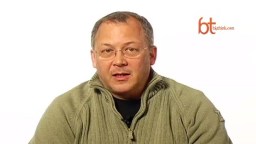Want to Make Genes Tell Secrets? Silence Them.

Dr. Gregory Hannon’s lab may be a place of “organized chaos,” but the work coming out of it is revolutionizing medical science. By manipulating the RNA interference (RNAi) pathway that functions as a defense mechanism within cells, Hannon’s team “silences” individual genes in order to understand their biology better. The genes they’re most interested in? Those that play a role in the development of cancer.
In his Big Think interview, Dr. Hannon describes the barriers that currently stand between RNAi manipulation and new cancer therapies, and predicts how they will ultimately be overcome. He also tells the story behind his research into a particularly exotic form of cancer: the transmissible facial tumor currently devastating Tasmanian Devil populations. (The tragedy was first brought to his attention by a conservation-minded Tasmanian grad student.)
Speaking of grad students, Hannon believes their training should be shorter. Curtailing academic education in favor of hands-on learning, he says, helps keep science “young and full of fire.” Youthful energy, in turn, comes in handy in a profession whose members must battle constant frustration…at least until the rare moment of discovery that makes it all worthwhile.




